|
President Ulysses S. Grant
Eighteenth President of the United States (1869-1877)
| President US Grant |
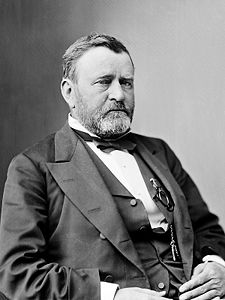
|
| President Ulysses S. Grant |
Born: April 27, 1822, in Point
Pleasant, Ohio
Died: July 23, 1885, in Mount McGregor, New York
Married: Julia Dent Grant
"I felt like anything rather than rejoicing at the downfall of a foe [Confederacy] who
had fought so long and valiantly..." General Ulysses S. Grant Memoirs: referring to the Confederacy's defeat.
Late in the administration of President Andrew Johnson, Gen. Ulysses S. Grant
quarreled with the President and aligned himself with the Radical Republicans. He was, as the symbol of Union victory during
the Civil War, their logical candidate for President in 1868.
When he was elected, the American people hoped for an end to turmoil. Grant
provided neither vigor nor reform. Looking to Congress for direction, he seemed bewildered. One visitor to the White House
noted "a puzzled pathos, as of a man with a problem before him of which he does not understand the terms."
Born in 1822, Grant was the son
of an Ohio tanner. He went to West Point rather against his will and graduated in the middle of his class. In the Mexican
War, he served under the commands of Gen. Zachary Taylor (12th President of the United States) and Gen. Winfield Scott.
| Ulysses S. Grant Home, Galena, Illinois |
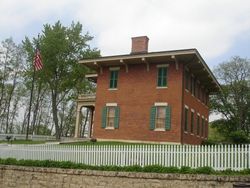
|
| General US Grant Home |
At the outbreak of the Civil War, Grant was working in his father's leather
store in Galena, Illinois. He was appointed by the Governor to command an unruly volunteer regiment. Grant "whipped it into
shape." In September 1861, he was promoted to the rank of brigadier general.
He sought to win control of the Mississippi Valley. In February 1862, he captured
Fort Henry and attacked Fort Donelson. When the Confederate commander asked for terms, Grant replied, "No terms except an
unconditional and immediate surrender can be accepted." The Confederates surrendered, and President Lincoln promoted Grant
to major general of volunteers.
At Shiloh in April, Grant fought one of the bloodiest battles in the West;
but, because of the thousands of casualties, some demanded his resignation. President Lincoln fended off demands for
his removal by saying, "I can't spare this man--he fights."
For his next major objective, Grant maneuvered and fought skillfully to win
Vicksburg, the key city on the Mississippi, and thus cut the Confederacy in two. He
subsequently broke the Confederate hold on Chattanooga.
Lincoln appointed him General-in-Chief in March 1864. Also, in 1864: Under
Grant's orders, Sherman advanced through the South, while Grant, with the Army of the Potomac, pinned down Gen. Robert
E. Lee's Army of Northern Virginia.
Finally, after four years of bloody
conflict, Lee surrendered at Appomattox Court House on April 9, 1865. Grant wrote out magnanimous terms of surrender
that would prevent "treason trials."
| Ulysses S. Grant Writing His Memoirs (1885) |
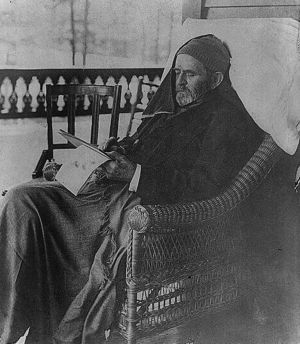
|
| General and President Grant |
Grant's account of
Lee's surrender at Appomattox Court House is particularly notable: "I felt like anything rather than rejoicing at the
downfall of a foe who had fought so long and valiantly, and had suffered so much for a cause, though that cause was, I believe,
one of the worst for which a people ever fought, and one for which there was the least excuse. I do not question, however,
the sincerity of the great mass of those who were opposed to us."
In Grant's memoirs, he states in detail his historic meeting with Lee
at Appomattox: "When I had left camp that morning I had not expected
so soon the result that was then taking place, and consequently was in rough garb. I was without a sword, as I usually was
when on horseback on the field, and wore a soldier’s blouse for a coat, with the shoulder straps of my rank to indicate
to the army who I was. When I went into the house I found General Lee. We greeted each other, and after shaking hands took
our seats. I had my staff with me, a good portion of whom were in the room during the whole of the interview.
What General
Lee’s feelings were I do not know. As he was a man of much dignity, with an impassible face, it was impossible to say
whether he felt inwardly glad that the end had finally come, or felt sad over the result, and was too manly to show it. Whatever
his feelings, they were entirely concealed from my observation; but my own feelings, which had been quite jubilant on the
receipt of his letter, were sad and depressed. I felt like anything rather than rejoicing at the downfall of a foe who had
fought so long and valiantly, and had suffered so much for a cause, though that cause was, I believe, one of the worst for
which a people ever fought, and one for which there was the least excuse. I do not question, however, the sincerity of the
great mass of those who were opposed to us ...
We soon fell into a conversation about old army times. He remarked that
he remembered me very well in the old army; and I told him that as a matter of course I remembered him perfectly, but from
the difference in our rank and years (there being about sixteen years’ difference in our ages), I had thought it very
likely that I had not attracted his attention sufficiently to be remembered by him after such a long interval. Our conversation
grew so pleasant that I almost forgot the object of our meeting. After the conversation had run on in this style for some
time, General Lee called my attention to the object of our meeting, and said that he had asked for this interview for the
purpose of getting from me the terms I proposed to give his army."
| President US Grant History |
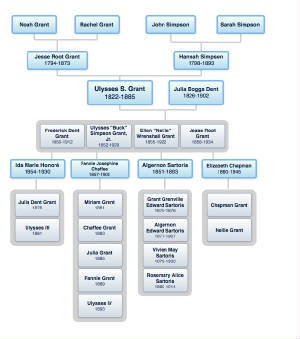
|
| President US Grant Genealogy |
| President US Grant |

|
| President US Grant |
| Union General US Grant |
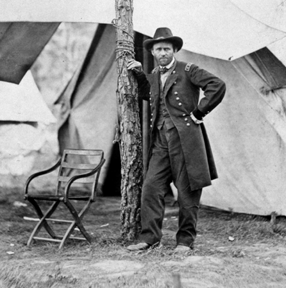
|
| Civil War General US Grant |
| President US Grant |

|
| President US Grant |
| Tombs of Ulysses & Julia Grant (Manhattan) |
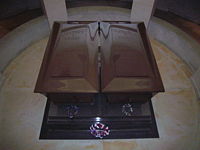
|
| President and Mrs. US Grant |
As President, Grant presided over the Government as he had commanded
the Army. (He even brought a fraction of his Army staff to the White House.)
Although a man of scrupulous honesty, Grant as President accepted handsome
presents from admirers. Worse, he allowed himself to be seen with two speculators, Jay Gould and James Fisk. When Grant realized
their scheme to corner the market in gold, he authorized the Secretary of the Treasury to sell enough gold to wreck their
plans, but the speculation had already wrought havoc with business.
During his campaign for re-election in 1872, Grant was attacked by Liberal
Republican reformers. He called them "narrow-headed men," their eyes so close together that "they can look out of the same
gimlet hole without winking." The General's friends in the Republican Party were 'known proudly' as "the Old Guard."
Grant allowed Radical Reconstruction to run its course in the South, bolstering
it at times with military force.
After retiring from the Presidency, Grant became a partner in a financial
firm, which later went bankrupt. About that time, he learned that he had throat cancer. He started writing his recollections
to pay off his debts and provide for his family; terminally ill, Grant produced a literary masterpiece, his memoirs,
that ultimately earned nearly $450,000. Soon after completing the last page, in 1885, he died. His memoirs are revered
by many as the best "insights of the general and the American Civil War." President Grant will forever be known
as an American hero and symbol of perseverance.
Sources: whitehouse.gov; Memoirs of U. S. Grant; National Archives (NARA);
Library of Congress (LOC)
|

